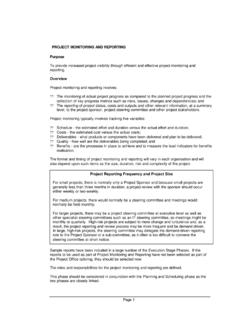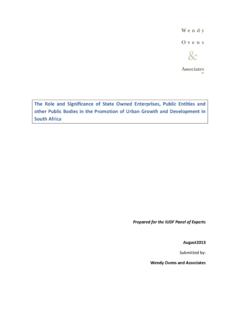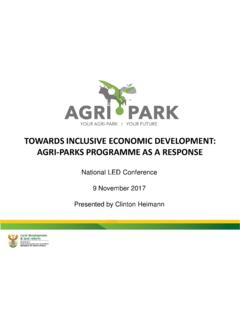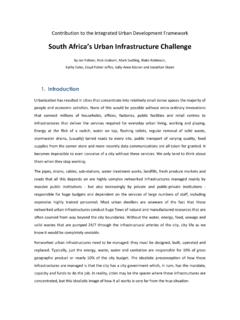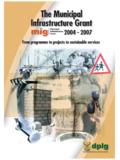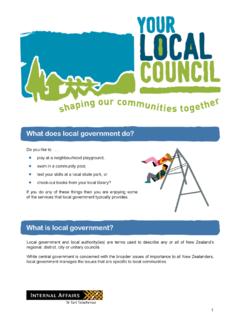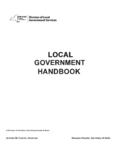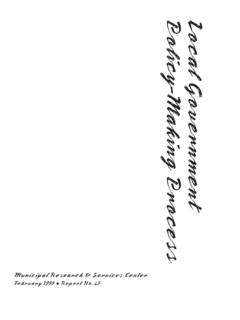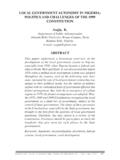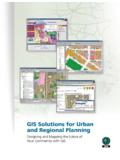Transcription of White Paper on Local Government
1 The White Paper on Local Government 9 March 1998 The White Paper is dedicated to the memory of Tshepiso Mashinini (1966-1998), chairperson of the White Paper Working Committee, and all the other women and men who contributed to the building of a democratic system of Local Government in South Africa CONTENTS Foreword by Minister Mohammed Valli Moosa Foreword by Mr Pravin Gordhan Introduction SECTION A: CURRENT REALITY 1. A history of Local Government 2. The current state of Local Government The different forms of municipality Local Government finance Administration Legislative complexity Powers and functions Global and national trends The transition process 3. Settlement patterns and trends Introduction Settlement types The implications of current settlement patterns 4.
2 Defining the challenge for Local Government Challenges facing South African municipalities 5. Concluding comment SECTION B: DEVELOPMENTAL Local Government 1. Characteristics of developmental Local Government Maximising social development and economic growth Integrating and coordinating Democratising development, empowering and redistributing Leading and learning 2. Developmental outcomes of Local Government Provision of household infrastructure and services Creation of liveable, integrated cities, towns and rural areas Local economic development Reviewing existing policies and procedures to enhance employment and investment Provision of special economic services 3. Tools and approaches for developmental Local Government Integrated development planning, budgeting and performance monitoring Why do integrated development planning?
3 The legislative framework What is required of municipalities? Performance management Working together with Local citizens and partners 4. Concluding comment SECTION C: COOPERATIVE Government 1. The framework of intergovernmental relations Cooperative relations between spheres Intergovernmental relations Roles and responsibilities of national and provincial Government National Government Provincial Government 2. Working with Local Government National policies and programmes Cooperative Government in practice 3. Horizontal cooperation between municipalities Organised Local Government Informal and international relationships between municipalities 4. Concluding comment SECTION D: INSTITUTIONAL SYSTEMS 1. Introduction The constitutional framework Meeting South Africa's needs 2.
4 Metropolitan Government What is a metropolitan area? Why have metropolitan Government in metropolitan areas? Metropolitan Government institutions The context Roles and responsibilities of the Metropolitan Council Metropolitan Government systems Managing the transition process in metropolitan areas Anticipating the future in metropolitan areas Concluding comment 3. District Government The need for district Government Roles and responsibilities of district Government Integrated development planning Infrastructural development Technical assistance to municipalities Direct service provision at Local level Category (B) municipal institutions Concluding comment 4. Traditional leadership The role of traditional leadership Policy directions The relationship between traditional leaders and Local Government Concluding comment 5.
5 The demarcation of municipal boundaries Concluding comment SECTION E: POLITICAL SYSTEMS 1. Political leadership 2. Political systems The delegation of executive powers Constitutional framework Individual and collective executives The extent of delegation Committee systems Municipal types 3. Municipal elections Electoral systems Ward delimitation Number of councillors 4. Concluding comment SECTION F: ADMINISTRATIVE SYSTEMS 1. The need for change 2. New approaches to service delivery Principles for service delivery Approaches to service delivery Building on existing capacity Corporatisation Public-public partnerships Partnerships with community-based organisations and non-governmental organisations Contracting out Leases and concessions Transfer of ownership Choosing service delivery options 3.
6 Core administrative capacities to support development 4. The training system 5. Labour relations 6. The role of other spheres of Government 7. Concluding comment SECTION G: MUNICIPAL FINANCE 1. The current situation Basic features The Constitution Policy objectives 2. A framework for a new municipal financial system Local revenue instruments and policies Property taxation Regional Service Council and Joint Services Board levies Fuel levy User charges Credit control Financing municipalities in rural areas Intergovernmental transfers Agency payments Capital transfers Transfers to fund operating costs Targeting intergovernmental transfers Local Government participation 3.
7 Leveraging additional investment in the municipal sector Borrowing and investment powers of municipalities Credit enhancement Concessional loan finance 4. Budgeting, accounting, financial reporting and management Generally accepted accounting practice for municipalities Reserves, provisions and funds Capital accounting Internal reporting External reporting 5. Concluding comment SECTION H: THE TRANSFORMATION PROCESS 1. Building on the past five years 2. Establishing a stable framework 3. Support mechanisms for municipal transformation Annexure A: Reference guide on legislation affecting Local Government Annexure B: Number of municipalities per province/region Annexure C: Maps Annexure D: Summary of the principles in Chapter 1 of the Development Facilitation Act In Memoriam: Tshepiso Mashinini Glossary FOREWORD BY MR MOHAMMED VALLI MOOSA Minister for Provincial Affairs and Constitutional Development South Africa has been given a rare and historic opportunity to transform Local Government to meet the challenges of the next century.
8 Although Local Government will, until 1999, remain subject to the precepts of the transition process as regulated by the Local Government Transition Act, 1993, the new Constitution envisages a complete transformation of the Local Government system. In terms of the new Constitution, Local Government is a sphere of Government in its own right and no longer a function of national or provincial Government . Local Government has also been given a distinctive status and role in building democracy and promoting socio-economic development. The Ministry for Provincial Affairs and Constitutional Development has embarked on a policy process that will give effect to this new vision of Local Government . An intensive 18-month period of consultation and research has culminated in the White Paper on Local Government . This White Paper spells out the framework and programme in terms of which the existing Local Government system will be radically transformed.
9 It establishes the basis for a system of Local Government which is centrally concerned with working with Local citizens and communities to find sustainable ways to meet their needs and improve the quality of their lives. In the development of this White Paper , every effort has been made to ensure that the process has been inclusive, interactive and transparent. A three-phase approach ensured that all stakeholders were included in the consultative process over the past eighteen months. The first phase of consultations resulted in a discussion document published in April 1997, containing the initial strategic questions to be addressed in the White Paper . The second phase, which consisted of issue-focused research processes, provincial and Local workshops and other consultation mechanisms, resulted in the Green Paper on Local Government , which was released for public comment in October 1997.
10 The third phase, consisting of Portfolio Committee hearings, a Local Government Summit, public submissions and sectoral consultative conferences, resulted in the White Paper on Local Government , which has been approved by Cabinet. Appropriate legislation will now be prepared to enact the policy directions contained in the White Paper . This White Paper on Local Government is unique, as it does not deal with a sectoral policy, but with an entire sphere of Government . It can almost be regarded as a "mini-Constitution" for Local Government , as it will affect all South Africans. Local Government is the sphere of Government that interacts closest with communities, is responsible for the services and infrastructure so essential to our people's well being, and is tasked with ensuring growth and development of communities in a manner that enhances community participation and accountability.
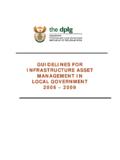
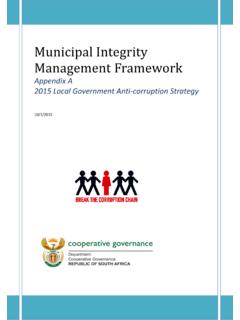
![Disaster Management Act [No. 57 of 2002]](/cache/preview/e/5/d/2/b/3/6/7/thumb-e5d2b36743b64ebe9204d7e874f734ad.jpg)

